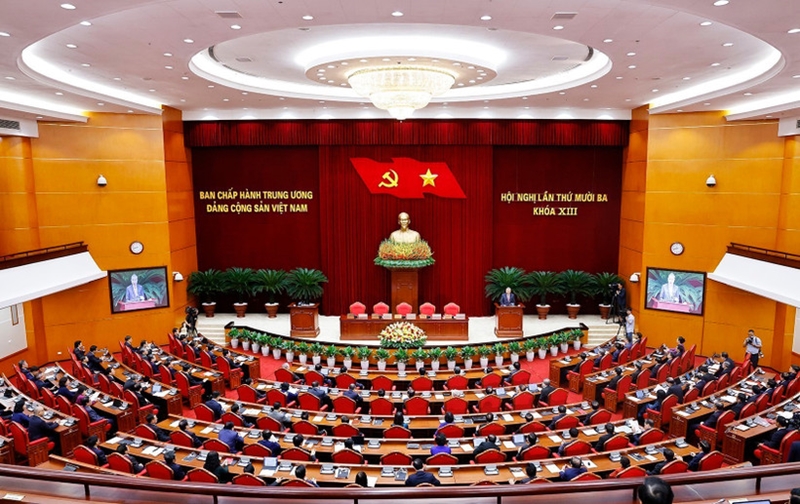Accordingly, the 14th National Party Congress, scheduled to last seven days from January 19 to 25, 2026, will review and approve a political report, a report summarizing some theoretical and practical issues arising from 40 years of the socialist-oriented Doi Moi (Renewal) cause in Vietnam, a report on the 15-year implementation of the Party Statutes, a self-assessment report on the leadership and direction by the 13th Party Central Committee.
    |
 |
|
The 13th meeting of the 13th Party Central Committee closes on October 8, 2025. |
The congress will also debate and adopt a report on personnel affairs of the 14th Party Central Committee, and elect the 14th Central Committee in accordance with the election regulations of the 14th National Party Congress.
Regarding the working and election regulations of the 14th National Party Congress, the Party Central Committee emphasized that issuing and effectively implementing these rules is crucial for the congress’s success.
At the 13th meeting, the Party Central Committee reviewed, discussed, and gave feedback on the draft working and election regulations for this congress, ensuring compliance with the Party Statutes, as well as the principles, regulations, and rules of the Party Central Committee; balancing continuity with innovation to suit the Party’s renewed leadership approach and realities; and pro-actively preventing, resolutely fighting, and strictly dealing with any negative or wrongful actions, according to the guidance.
The working regulations of the 14th National Party Congress consist of six chapters with 16 articles, retaining the provisions of the 13th Congress’s working regulations, while also supplementing and revising certain contents to better reflect the reality. Meanwhile, the election regulations of the coming congress comprise five chapters with 24 articles, inheriting all 18 articles from the election regulations of the previous congress and revising contents of six articles.
The Party Central Committee tasked the Politburo with further reviewing, incorporating feedback, and perfecting the drafts for submission to the 14th Congress for approval.
The Party Central Committee assessed that the draft documents were meticulously prepared, carefully revised, updated, and supplemented multiple times, particularly incorporating the contents approved at the 11th and 12th meetings of the Party Central Committees. The drafts feature many new points, reflecting a candid assessment of the current situation. Based on this, they outline guiding principles, national development goals, key directions and tasks, and breakthrough solutions for fast and sustainable national development, showing the nation’s strong aspirations in the new era.
Regarding personnel affairs for the coming congress, based on nominations from Party committees and organizations, as well as verification, review, and supplementary conclusions from relevant agencies, the Politburo conducted a comprehensive evaluation, agreed on the candidate list, and carried out the nomination voting process in accordance with regulations.
The Politburo also conducted nomination voting for the 14th Central Party Committee’s Inspection Commission. It reported to the Central Committee for feedback on the proposal regarding the results and plan for nominating personnel to the 14th Party Central Committee and its Inspection Commission. Voting on nominations for the 14th Party Central Committee and its Inspection Commission was conducted in accordance with regulations. This is seen as an “especially important” task and the “key of all keys”, decisive to the success of the 14th National Party Congress and the country’s development in the new period.
The guidance also demanded thoroughly disseminating the outcomes of the 13th meeting of the 13th Party Central Committee to all Party committees and organizations, agencies, units, and Party members across the political system, focusing on the four areas highly agreed upon by the Party Central Committee, particularly the organization preparations for the 14th Congress.
Communications should be carried out via the press, official websites of ministries, agencies, and localities, digital platforms, and social media (Facebook, Zalo, YouTube, etc.), as well as internal bulletins, publications, and other accessible materials, ensuring clear and diverse content targeted at multiple groups of citizens.
Source: VNA